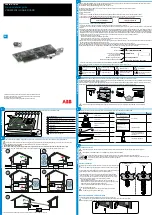
Section 7. Installation
139
•
Battery temperatures are the lowest
•
System power requires are often the highest
The CR6 is internally protected against accidental polarity reversal on the power
inputs.
The CR6 has a modest-input power requirement. For example, in low-power
applications, it can operate for several months on non-rechargeable batteries.
Power systems for longer-term remote applications typically consist of a charging
source, a charge controller, and a rechargeable battery. When ac line power is
available, a Vac-to-Vdc wall adapter, the on-board charging regulator, and a
rechargeable battery can be used to construct a UPS (un-interruptible power
supply). See
Power Input Terminals — Specifications
(p. 122)
for power supply
requirements and limits.
Caution
Voltage levels at the
12V
and switched
SW12
terminals, and pin
8 on the
CS I/O
port, are tied closely to the voltage levels of the main
power supply. For example, if the power received at the
BAT
terminals is
16 Vdc, the
12V
and
SW12
terminals, and pin 8 on the
CS I/O
port, will
supply 15.7 Vdc (0.3 V less than main supply) to a connected peripheral.
If the connected peripheral or sensor is not designed for that voltage level,
it may be damaged.
7.2.1 Calculating Power Consumption
System operating time for batteries can be determined by dividing the battery
capacity (ampere-hours) by the average system current drain (amperes). The CR6
typically has a quiescent current drain of <1 mA (with display off) 3 mA with a 1
Hz sample rate, and 67 mA with a 20 Hz scan rate. When the CR1000KD
Keyboard/Display is active, an additional 7 mA is added to the current drain while
enabling the backlight for the display adds 100 mA.
7.2.2 Power Sources
Related Topics:
•
Power Input Terminals — Specifications
(p. 122)
•
Power Supplies — Quickstart
(p. 41)
•
Power Supplies — Overview
(p. 93)
•
Power Supplies — Details
(p. 138)
•
Power Supplies — Products
(p. 666)
•
Power Sources
(p. 139)
•
Troubleshooting — Power Supplies
(p. 566)
Be aware that some Vac-to-Vdc power converters produce switching noise or
ac
(p. 573)
ripple as an artifact of the ac-to-dc rectification process. Excessive
switching noise on the output side of a power supply can increase measurement
noise, and so increase measurement error. Noise from grid or mains power also
may be transmitted through the transformer, or induced electro-magnetically from
nearby motors, heaters, or power lines.
Summary of Contents for CR6 Series
Page 2: ......
Page 4: ......
Page 6: ......
Page 32: ......
Page 36: ......
Page 38: ......
Page 76: ...Section 5 Overview 76 FIGURE 20 Half Bridge Wiring Example Wind Vane Potentiometer ...
Page 80: ...Section 5 Overview 80 FIGURE 23 Pulse Input Wiring Example Anemometer ...
Page 136: ......
Page 454: ...Section 8 Operation 454 FIGURE 104 Narrow Sweep High Noise ...
Page 459: ...Section 8 Operation 459 FIGURE 106 Vibrating Wire Sensor Calibration Report ...
Page 535: ...Section 8 Operation 535 8 11 2 Data Display FIGURE 121 CR1000KD Displaying Data ...
Page 537: ...Section 8 Operation 537 FIGURE 123 CR1000KD Real Time Custom ...
Page 538: ...Section 8 Operation 538 8 11 2 3 Final Storage Data FIGURE 124 CR1000KD Final Storage Data ...
Page 539: ...Section 8 Operation 539 8 11 3 Run Stop Program FIGURE 125 CR1000KD Run Stop Program ...
Page 541: ...Section 8 Operation 541 FIGURE 127 CR1000KD File Edit ...
Page 546: ......
Page 552: ......
Page 610: ...Section 11 Glossary 610 FIGURE 137 Relationships of Accuracy Precision and Resolution ...
Page 612: ......
Page 648: ......
Page 650: ......
Page 688: ......
Page 689: ......
















































